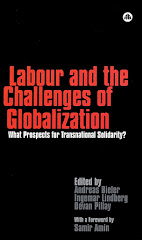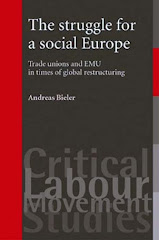The outcome of the 2014 elections and Belgium’s “hot
autumn”
 |
| Photo by Dimi15 |
It soon became clear that both the Flemish government
(formed by July 2014) and the federal government (formed by October 2014) would
implement a right-wing policy programme, together comprising austerity
measures, wage moderation, lower social security contributions for business, the
hollowing out of public services, higher fees for utilities such as water, electricity
and public transport, lower pensions and a higher retirement age (from 65 to
67), more expensive higher education, obligated community service for the
unemployed and the slashing of subsidies for the arts. While previous
governments in Belgium have, of course, also introduced neoliberal measures,
this is probably the clearest attempt until now to put Belgium onto a
decisively neoliberal path, with a clear attack on workers’ rights, trade
unions and public services.
As a result, Belgium’s trade unions (contrary to the
political parties still organized as national organizations, but with regional
substructures), the social-democratic ABVV-FGTB, the christen-democratic
ACV-CSC, and the liberal ACLVB-CGSLB, announced a “hot autumn” against the
proposed government measures. It started with a manifestation in Brussels on
Thursday November 6. To the surprise of the trade unions themselves, this
manifestation featured more than 120.000 demonstrators, thereby being the
largest trade union manifestation in 30 years. After that, on three consequent
Mondays (November 24, December 1 and December 8) there were provincial strikes,
each time in different provinces. Finally, on December 15, the grand finale of the social protest was a
national strike. The main demands, integrated into a larger whole of claims,
concern the introduction of a wealth tax and the principle of tax justice, and
the withdrawal of both the wage moderation measures and the increase of the
retirement age.
 |
| Photo by Tijl Vercaemer |
Opportunities and possibilities
The series of protests and strikes, especially the
large manifestation on November 6, have led to a strengthening of the trade
union position. It brings with it several opportunities for a broader revitalization
of the Belgian labour movement, as well as the possibility of a longer-term
change in the balance of power. First, an alliance has been forged in Flanders
between trade unions on the one hand and social movements (anti-poverty
movements, women’s movements, development NGOs, environmental NGOs, the youth
sector) and the cultural sector on the other hand. It is especially novel that
the cultural sector is so politicized. This alliance has been institutionalized
in Flanders in the citizen’s platform “Hart boven Hard” (literally: “Heart over
Hard”), which has recently found a Walloon counterpart, “Tout Autre Chose”
(“Totally different”). This citizens’ platform has organized bicycle tours
around picket lines, cultural events with music, poetry and speeches as an act
of solidarity on the day of strikes (or the day before) and the making of a “soundtrack
of the resistance”. If this cooperation
can be the foundation for a long-term alliance between trade unions, social
movements and the cultural sector, then this is clearly a very significant
development.
Second, there is a rather strong sense of unity within
this movement. This is both the case within trade unions (e.g. between
white-collar workers and blue-collar workers), between the different unions
(especially important with regard to the two largest trade unions ABVV-FGTB and
ACV-CSC), between the unions and the social movements, and even between the
different left-wing opposition parties (the social-democratic Flemish sp.a and Walloon
PS, the green parties Groen and Ecolo, and the former Maoist radical-left party
pvda-ptb, still a national party). While Belgium is often divided along
linguistic lines, the protests also seem to be equally strong in the
Dutch-speaking north and the French-speaking south. It helps, of course, that
everyone in society (except for the rich and large corporations) is hit by the
government measures.
Finally, it seems that the tide has been turning to a certain extent in both the battle of ideas and the balance of power. While before the elections the mainstream media portrayed trade unions as conservative organizations without much support, recent events have led to a partial change in this regard. Moreover, helped by the recent revelations about multinationals’ tax avoidance (the Luxleaks scandal in particular) and the fact that the rich are untouched by the austerity measures, there is a general feeling that the government measures are “unfair” in that the rich and powerful do not contribute. A recent survey found that 56 per cent of the population “understands” the strikes, and almost 80 per cent thinks that the austerity measures are not “fair”. While the battle of ideas is far from won, this renewed legitimacy for left-wing ideas (such as a wealth tax) and trade unions opens up possibilities for a stronger fight against neoliberal ideas and for alternative left-wing policies.
 |
| Photo by Dimi15 |
Finally, it seems that the tide has been turning to a certain extent in both the battle of ideas and the balance of power. While before the elections the mainstream media portrayed trade unions as conservative organizations without much support, recent events have led to a partial change in this regard. Moreover, helped by the recent revelations about multinationals’ tax avoidance (the Luxleaks scandal in particular) and the fact that the rich are untouched by the austerity measures, there is a general feeling that the government measures are “unfair” in that the rich and powerful do not contribute. A recent survey found that 56 per cent of the population “understands” the strikes, and almost 80 per cent thinks that the austerity measures are not “fair”. While the battle of ideas is far from won, this renewed legitimacy for left-wing ideas (such as a wealth tax) and trade unions opens up possibilities for a stronger fight against neoliberal ideas and for alternative left-wing policies.
Risks and challenges
However, it should also be noted that there are risks
and dangers, which cannot be easily brushed aside. The first risk is, of course,
that divisions within the protest movement would resurface. While unity has
been maintained until now, as explained above, there are many potential disagreements
and differences in interests, which are of course greedily exploited by the
right. For instance, there can be disagreements between the two largest trade
unions. The christen-democratic trade union ACV has a historical relation with
the christen-democratic party CD&V, which is part of the government. It
could therefore be less inclined to keep up the protest, and be satisfied with
cosmetic changes in the government’s policy programme.
 |
| Photo by Dimi15 |
A second potential risk is disappointment, if the
protests do not lead to direct and easily recognizable results. This is
especially important for the large swath of people who have participated in
strikes and manifestations for the first time in a long time. If they believe
the right-wing mantra that “strikes do not make a difference”, then this has
negative consequences for the long-term future of the labour movement. It will
be important for the trade unions, social movements and cultural organizations
involved to develop an alternative discourse on the results of the protest
movement (which has in a certain sense already made an impact in the battle of
ideas, and which is bound to have a stronger impact for the coming years), so
that this does not develop into a defeat similar to the defeat of the miners in
the UK under Thatcher.
 |
| Photo by Dimi15 |
Third, related to this, we should not be naïve about the potential impact of the strikes and manifestations, as long as the global balance of power is in favour of capital and unfavourable to a left-wing project. While little Belgium has in a certain sense been one of the Western countries which has seen less neoliberalization until now, it is not a left-wing island on a neoliberal globe. In this sense, what happens to Belgium is also dependent on what happens in the world, and especially within the European Union. It is, therefore, highly important that left-wing movements and projects change the balance of forces in other European countries as well.
Finally, while the protest movement clearly has a
left-wing (and anti-neoliberal) character, it has not at all advanced an
anti-capitalist agenda (except for a few traditional radical left-wing
organizations). Many people in the movement still believe in a renewed “social
compromise” and “social dialogue” between capital and labour. The relation
between the government’s right-wing programme and the features inherent to a
capitalist society (“competitiveness”, the profit motive, the structural power
of capital) is not sufficiently exposed. It will therefore be a challenge for
more radical activists to link the struggles to more radical thinking, and to
reactivate the imagination of the people, so that a post-capitalist society becomes
a little less unthinkable.
Sacha Dierckx recently obtained his Phd in
Political Science at Ghent University. His research examined whether Brazil,
India and China will challenge the Western-based neoliberal norm of the free
movement of capital. Sacha is currently still affiliated to the Ghent Institute
for International Studies (GIIS) at Ghent University. He also writes regularly
for the Flemish think tank Poliargus (http://www.poliargus.be).












Agree with most points in the analysis. There are some things that might be considered more closely though:
ReplyDelete- the failure of social-democractic parties/ policies: for almost 2 decades, the social-democrats from Flanders and Wallonia have participated or supported policies that could be described as Third way and would be reasonable under the older labor market conditions (e.g. without taking into account polarization in the labor market with disappearing middle segments). With the latter phenomenon, support for broad welfare state policy (free busses, very cheep tuition fees etc) that are sometimes reversely redistributive is lost, and sometimes rightly so.
-Therefore, there could be some valid points for criticizing this too broad welfare state policies which have neglected focus and attention for more radical redistribution. This is now (unfortunately) exploited by the rightwing parties as a kind of minimalist rawlsian weapon against (centre-)left parties.
- Therefore, if the Left really wants to shift the focus, it really has to do away with a defense of some of these broad welfare programs (e.g. tax credits for loans to buy houses, very low tuition fees, free busses …)
- Focus has to be given to more radical and creative thought, e.g. wealth tax or capital gains tax (which is now a good assembling point for protests), a graduation tax instead of the current alternatives between either uniformly low or high tuition fees ...